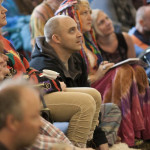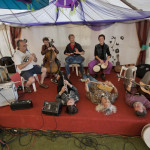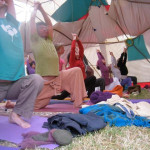I blog a lot about inequality and fairness. On a related note, today I want to talk about money. Personally, I live comfortably, modestly but with a certain amount of insecurity. I have education, health, and a husband who earns a fair, if uncertain amount of money. We have no children to support, and honestly, we probably wouldn’t be able to afford them. We have a small inheritance that we’re saving in the hope that one day it will magically combine with the equity building in the cute little terrace house we bought a few years ago, and we will be able to move somewhere small, modest and rural. One day, we might have paid off the mortgage. We are very unlikely to ever have a pension. And my husband is a decade older than me, and our finances are more likely to get much tighter at some point unless I find a way to earn a living wage. We are tremendously lucky, but we are far, far from wealthy. We are self-employed and love what we do. This way of working, and our lack of significant dependants allows us to pour a lot of time and energy into community projects of one kind and another.

One thing we have been drawn more and more into in the last few years, is the RainbowFutures camps. We have sound, selfish reasons for that – these people have become friends, the shifting summer community is a great tribe to become part of, the fun we have is immense, and we adore being able to spend much of the summer under canvas in a field. To do so, we would give a lot. To do so, we do give a lot. What we don’t give, usually, is money. Last summer, let’s see…we both went to early meetings and were involved in a tiny way with the huge project to set up the field. I co-ran one of the camps, worked in the café at the three others, and ran workshops here and there. Oh, and I produced the flyers too, and taught yoga half a dozen times or more.

Phil worked in the site crew on and off at two camps, and ran the site crew and helped Mark and I co-run another camp. This winter, Phil has been part of a small team invited to advise on the business and financial security of the camps, and also fixed and updated the online ticketing system, and I’ve been making more pretty flyers, helping with websites and helping Mark plan and field enquiries for DruidCamp this summer. We are not unusual. We might receive a little cash here and there when there’s extra in the pot, although it rarely covers petrol costs, never mind our time. We get fed good meals, and we don’t usually pay for tickets. Essentially, anyone working about 4 hours a day at a camp, or being a significant part of the support crew of accountants, web designers, and so on, will be given free entry, and usually get a free ‘plus one’ for their partner or friend too – although the camps vary in the deals on offer. A few professional performers will get paid. Everyone else buys a ticket.

This is a common way of running a community event. I also help out where and when I can with the Santosa yoga camp, and similar deals are made. At Santosa, for example, even people who are coming onsite to teach still work a few hours a day of ‘karma yoga’ – that’s the yoga of community labour. There’s a real joy to be found calmly chopping vegetables for dinner and chatting away with yogis and yoginis you haven’t met before. Because of this volunteer work, the camp can afford to include meals in the ticket price. I’m telling you all this because in the society most of us live in today, our experience of exchange is a corporate one, where someone, somewhere is looking to make the most money possible.

And so the ingrained, unexamined cultural practice of a lot of people I meet is to look for the bargain – for the cheapest way possible to do something. I’ve had people ask me at DruidCamp if ‘this was my job’ – as if the finances of the situation could support a team of people working fulltime for a year. I field enquiries from people I’ve never heard of expecting to get a free ticket for giving a single talk on an obscure topic. I’ve defended the café for deciding to put up the price of a slice of cake because their costs rise, and they wanted to keep the main meals as cheap as possible for people.

I had to explain why the running costs at a Starbucks are less than those of constructing a commercial-grade kitchen in a field; and why people who spend three months running that kitchen fulltime also need to make enough to pay the rent on their house at the same time. None of the camps I know of are registered charities, and not all are completely non-profit. Sometimes, people who don’t have sufficient income from elsewhere to allow them to spend a quarter of the year not earning, take a modest amount when the camps are doing well. Some have micro-businesses on the side to help – hiring out tents or selling a few clothes, for example. But hand on heart I can tell you, in the diverse range of small camps and tiny festivals and other community events out there, even people earning a little from it are getting less than minimum wage for the endless numbers of hours they put in.

We do it for the love of it, as I said at the beginning. We do it for the enthusiastic hugs of people who have had a whole new experience of life and know that they’ll be back next year dragging friends with them. We do it for the peace of being away from roads and news media and advertising and all the irritants of modern life (although not away from the internet – smart phones are amazing tools for running things in a field!). And we do it for the people who give, as we do, offering to run a workshop on song-writing here, help build the sweatlodge over there, and run the chai stall for an hour while someone has to pop offsite to fetch someone from the station. People who give, not in exchange for the free ticket, but give to the event, to the tribe, to the community we build together. It’s about tribe and land and the song in our hearts at the end of a good day.

So, it’s a pretty good part of our life, really, and addictive in the best way. But because the camps are run by people who are giving from their hearts, with the spare change of their energy after ‘real’ life has taken its due, things can be chaotic. This year, for example, our amazing Children’s Area co-ordinator for DruidCamp can’t run the area for us, because she has a tiny baby that takes higher priority. It’s going to be hard to find a team to match the standard she has set in recent years. And if we don’t, I know there’ll be at least one regular ‘customer’ who will complain. More importantly, after two decades of hard use, the canvas of the RainbowFutures marquees are in need of replacing.

The hard fact is, the camps haven’t been run with an eye to the financial long-term. We’re trying to change that, because to lose that tribe, that gathered talent, and those summers would be a significant cultural loss to a world that would sadly never notice. And so, after much discussion that is way out of my (volunteer) pay grade, the decision was made to raise prices. Let’s recap here – it’s still eminently possible to come to camp, work hard and not pay for a ticket. And there’s a ‘Friends of’ group being launched at those who pay to come to more than one camp a year, and that will give discounts that match the rise in prices, for a (small) fee. And no-one, no-one on the crew is becoming financially wealthier in exchange for the months of work being put in.

Almost all of the people who come to camp realise that this is the most sensible way forward. It is, in fact, the only way forward, other than putting on camps in slowly disintegrating structures until it all falls apart with a whimper, not a bang. But some don’t. One or two have complained – publically. We’ve been accused of profiteering by people who have no idea of how the camps are run. Accused by people who have never had to wonder how to find £5,000 every year just to get the infrastructure onsite, and store it when it’s not being used. Not to mention coordinating the weeks of volunteer labour to put it all up and take it all down again.

One or two people have ungraciously said they ‘suppose they’ll have to run a workshop’ instead of paying for a ticket. Interestingly, these same people are too talented or precious or too busy to wash up or haul wood for fires. We’ve had the camp prices compared to a ‘commercial campsite’, as if they were in any way equivalent, and as if the community event should obviously, always be cheaper. In fact, that’s a common theme – you run a community event, therefore it should be cheaper than the thin offering of a multinational corporation with economies of scale, little ethics or environmental responsibility and, somewhere down the line, probably slave labour too.

This is what I know – when I tell my yoga students how little I earn, and how much it costs in time, training and funds to be a yoga teacher; they stop looking for the cheapest option in coming to class and start leaving a tip. My friend and colleague has been teaching yoga for well over a decade, and might just make a living wage for the first time this year – she’ll probably never make back the costs of her extensive training. And this is a choice we willingly make. But if you attend community events – whether they’re run by your parish council or the Pagan Federation or a group of hippies in a field – they take your ticket price and they spread that further than you can ever imagine.

The new canvas for the marquees? It’s being put together in his spare time by the manager of a premium glamping site. The person running the Healing Area used to manage a Neal’s Yard therapy centre. The person doing the ‘Herb Walk’ is a licensed medical herbalist or a qualified ecologist. The partner of that facilitator who you think just sunbathes and smiles all day? She’s a chartered accountant who spent the winter untangling the books. We had to wait for our new flyer until the person we wanted to design our new logo had successfully hit his deadline for a graphic novel for Penguin. And all these people are giving their time, not as an exchange, but as a gift even if we gift them a little travel expenses as a gift in return. There are musicians that come and play at DruidCamp that will be paid one year and then not the next, depending on our finances. They still come, either way.

All these people are often busy with other community enterprises and events too, because once you start giving back, it often becomes a way of life. It’s a lifestyle that provides meaningful work, and there’s a lot of community studies research showing that meaningful, group tasks build depth and resilience in communities. It’s a powerful antidote to a lot of what ails us. People learn how to come together, and support each other…and fight and fall out and come together all over again. You come to trust someone faster when they’re holding the other end of something heavy; or when you know you can rely on them to crawl out of bed at 6am to light the fires so everyone gets a hot shower before breakfast. The truth is, we do this because we believe it helps to build a better world, in some small way, in isolated fields and village greens across the country. And we know we’re not alone.

But maybe it’s because when you meet these people, they’re a little scruffy from living in a field all week, that you think they’re unprofessional. And maybe they make what they do seem effortless, because no-one wants to be at an event that feels like hard work. And maybe they spend a lot of time just chatting, and catching up, and maintaining the social connections that make all tribal life work, instead of striding about with a clipboard looking important, and you think – well, that doesn’t look like hard work. It takes a lot to make a community event ‘feel’ easy. And yes, there may well be a few people there who aren’t pulling their weight, but unless you’re close to the heart of how it all works, you’re not going to be able to tell who they are; and even if you spot someone who hasn’t quite done a full shift, you’re probably not telling the organisers anything they don’t know already.

So, maybe, because it feels like the world you usually move through is out to get you, you’re the kind of person who thinks that ‘hard-working families’ have to watch out not to be taken for mugs by layabouts. Or maybe subconsciously you think that putting up a canvas marquee must be easy, because the people who do it are scruffy, and a little laid-back. Or because it hasn’t been made clear to you, you assume that the person who gets to stand up and announce things hasn’t also spent two days digging the compost toilets. Probably you don’t know how a community event is run at all, and you’re just not used to being surrounded by strangers who have spent months actively working to make your experience of the event as fantastic as possible. You don’t know that these people are waiting to see if you’ll turn out to be a ‘customer’, who arrives, is pleasantly entertained and considers their ticket money well spent; or a member of the tribe that they haven’t met yet.

If you are, I have a suggestion. Get involved. Stop being a consumer. Have a little trust and get stuck in. Some community events are hard work, stress and even a little toxic behind the scenes, but that’s okay, because this is the fastest way to find out if they are worth your time, energy and money. The best events will bring you firm friendship, solidarity, a sense of purpose and memories to treasure. From last summer, my fondest memories are of things you might not imagine of me: tessellating massage couches to avoid the drips through canvas in a heavy storm; cutting bender poles for the sweatlodge in a local wood; my husband delivering breakfast to me in morning meeting. But above all I miss the laughs, the smiles and the endless, endless deep hugs. There are tears, tantrums, hard graft and long days…and even one or two people I’m not looking forward to seeing again. But it’s not even Imbolc, and still in the grip of winter, and I miss that world in my bones. Bring me my summer! I’ll see you on the field.

All images are from my own files, or taken by the (volunteer) photographers for RainbowFutures, DruidCamp and the Santosa yoga camp.

